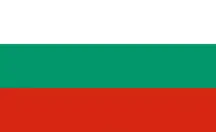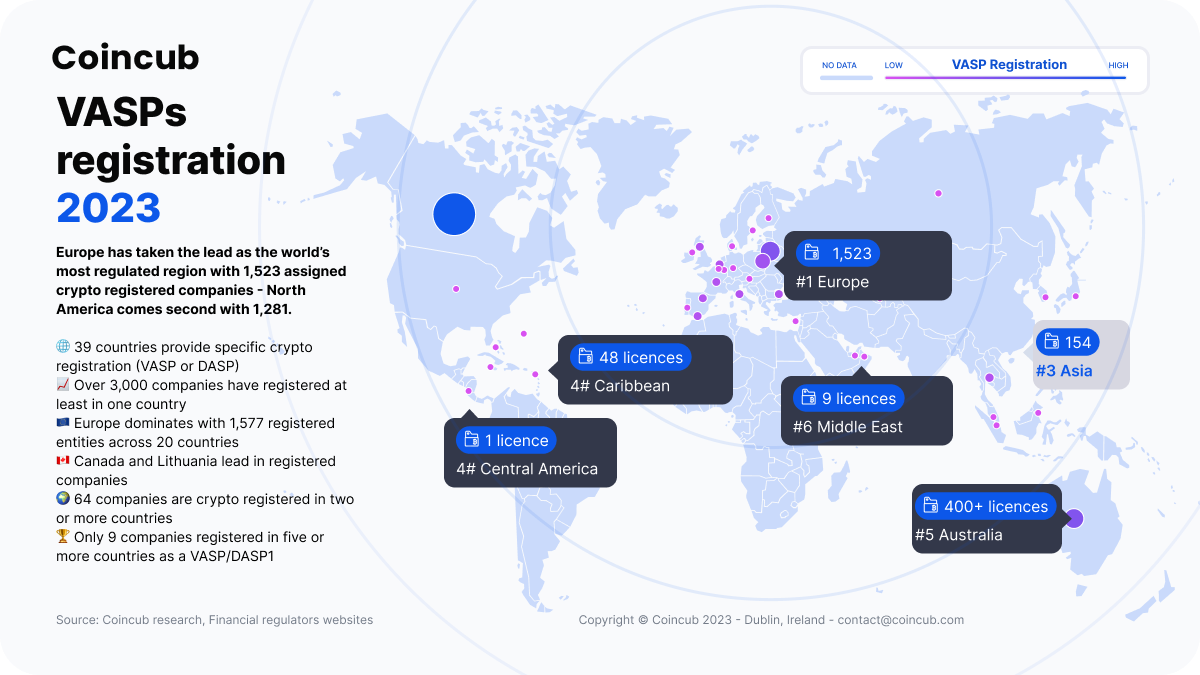
Canada leads the world in crypto registrations
The top five VASP licensing countries are currently Canada (1.254), Lithuania (694), Australia (400+)*, Italy (97), Bulgaria (84), and Spain (64) – France comes in at a close seventh place with 60. Yet despite these apparently high numbers, the licensing and registration of VASPs around the world have been erratic and uneven with many countries either slow to license VASPs or awaiting direction from new and updated legislation from their respective governments.
*Australia’s AUSTRAC does not make public this information.
What is a VASP?
Virtual or Digital Asset Service Providers known as VASPs or DASPs are companies able to conduct cryptocurrency transactions, including custodial services, the provision of crypto wallets, and payments that very much dictate the level of cryptocurrency adoption within any country. Companies known as Money Transmitters, some of which are able to transmit crypto, are not strictly speaking VASPs, and the index attempts to distinguish between the two. For instance, in Canada, the relevant license is called “Dealing in virtual currencies” and is issued by FINTRAC to a subset of Money Transmitter Service businesses.
Crypto registration in numbers
- Binance leads with most cryptocurrency registrations in 14 out of a total of 39 countries, followed by Coinbase (12), eToro (9) and Bitstamp (8).
- Major VASPs have limited licensing agreements in many economies
- Europe dominates global crypto licensing with 1577 licenses granted across 20 countries
- Canada has the highest number of crypto-licensed companies, followed by Lithuania
- 39 countries provide a specific crypto license (VASP or DASP)
- Over 3000 companies have a crypto license
- 64 companies have crypto licenses in two or more countries
- Only 9 companies are registered in five or more countries with a crypto license
Global inconsistency in naming cryptocurrency licensing: Navigating the world of VASPs and DASPs
Is it virtual or digital, an asset or a currency? Ok, maybe a service then…
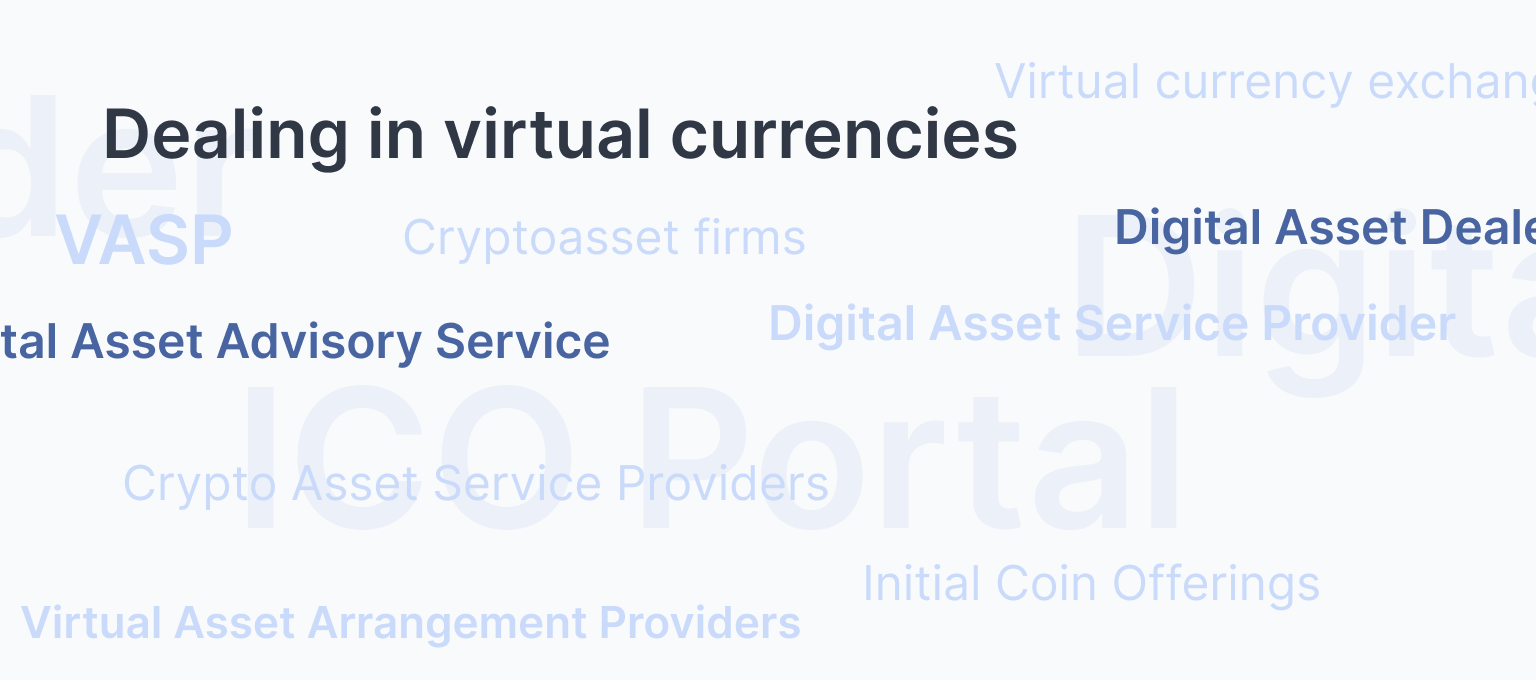
Fig 2: The different types of crypto registration
The naming of registration related to cryptocurrency and digital asset services across the world lacks a unified standard, resulting in a variety of terminologies and designations for similar types of licenses. This inconsistency can lead to confusion and difficulty in understanding the regulatory landscape for businesses and individuals operating in the global digital asset sector. The Central Bank of Ireland published a Regulation of providers of services relating to virtual assets called Virtual Asset Service Providers (‘VASPs’), while in Italy, it is called a “Digital Asset Service Provider” license issued by OAM. The Bahamas calls it a Digital Asset Business, Lithuania a Virtual currency exchange while in Bulgaria, the same type of licensing is called “Website or software data, incl. a mobile application for exchange between virtual currencies and non-gold-backed recognized currencies and/or private cryptographic key protection services on behalf of its customers for the holding, storage and transfer of virtual currencies” (translation by Google Translate). The disparity in naming conventions complicates compliance efforts, as companies need to navigate a multitude of different terms and regulatory authorities depending on the jurisdiction in which they operate.
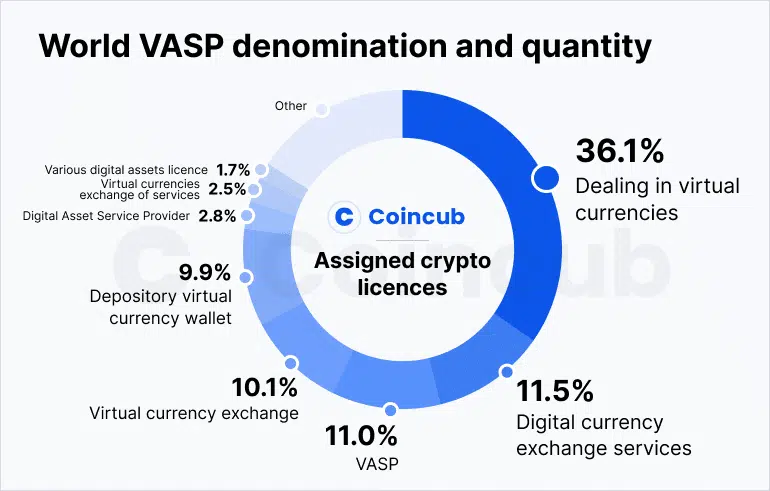
Fig 3: Crypto licensing globally by denomination and quantity assigned
The geography of crypto licensing
Leading the way in the provision of crypto licensing agreements globally, somewhat surprisingly, is Canada with the highest total of licensed ‘Dealing in virtual currencies’ companies among large developed economies. Canada outstrips the US and many other leading crypto economies such as Switzerland, France, Japan, and UAE with a total of 1.254 to date. Coming second in the Crypto Registration Report 2023 is Lithuania with 694.
The Financial Transactions and Reports Analysis Centre of Canada, FINTRAC, is Canada’s financial intelligence unit mandated to combat money laundering with whom money service business, including VASPs, needs to register. Whilst the US is becoming increasingly ambivalent towards crypto and is toughening its regulatory stance, registering in Canada appears to offer a number of advantages. These include swiftness of registration, no requirements for authorized capital – contrasting with countries in the EU – and also lower registration fees.
Similarly, the Lithuanian government offers transparent and cost-effective authorizations for the use of virtual currencies. VASPs offering cryptocurrency exchange services and cryptocurrency wallet services can expect a friendly and regulated environment.
The time needed to obtain a license is one month with no requirement for a physical presence in the country (and previously there was also the possibility of waiving a capital start-up contribution). This openness has been tightened up, however, with a requirement for VASPs to hold 125,000 euros.
While obtaining an MTL allowed crypto companies to legally operate in the US and provide services related to cryptocurrencies like storage and exchange, it is not a specific license for crypto-related activities. The New York Department of Financial Services (DFS) is the only state agency in the United States that offers a specific Virtual Currency Business License, also known as a BitLicense.

developing global standards, to address many investor concerns about cross border digital asset transactions. As the regulatory landscape for digital assets remains fragmented globally, it is encouraging to see this year that the EU finalized its digital asset legal framework. Canada provided clear licensing agreements for VASPs, including those involved in virtual currency dealings. The United States defined digital assets under its tax laws. New York State rolled out a bill targeting digital asset fraud that may serve as a model nationally. The US Treasury Department’s most recent report assessing risk, discussing myriad illicit finance challenges such as scams, ransomware, hacks, and money laundering advances the view that decentralized (De-Fi) platforms should implement anti-money laundering compliance under the Bank Secrecy Act – the U.S. AML regime. Nevertheless, there is still a lack of global standardization in naming conventions for digital asset regulation which adds to the complexity of compliance efforts for businesses and individuals operating in the cross border digital asset sector.”
The increasing recovery of bitcoin price sees growth of Virtual Asset Service Providers – VASPs – in the world’s low-tax crypto hotspots
As FTX becomes yesterday’s news and the rise in the price of bitcoin continues, so too does the increase in the number of VASPs worldwide – especially in the sunny environments of the Caribbean – and the Mediterranean.
Upfront in the Caribbean with some 18 VASPs are the Cayman Islands, followed by Bermuda with 16, and the Bahamas with 10. Nb St Vincent & the Grenadines has some 38 licensed ‘money transmitters’ – not strictly speaking VASPs but able to provide the transmission of crypto.
The Caribbean Islands are very digital currency positive, having all subscribed to, or trialing, state-sponsored digital currencies of their own. This enthusiasm is seen as a way of cutting the islands’ dependencies on cash and bringing unbanked sections of their communities into the financial loop. Regulations are light touch but increasingly becoming stronger on anti-money laundering and fraud. Apart from the sunshine, the obvious attractions are low or zero taxes for crypto gains as well as governments eager to provide a regulatory framework that attracts overseas investors.
In the top five regions for the licensing of VASPs, the Caribbean punches well above its weight and sits at number five n the Crypto Licensing Index with 85 licensed VASPs just behind Europe, North America, Australia and Asia at number one, two, three and four respectively.
Europe dominates with 1,577 crypto-registered companies across 20 countries. This is a testament to why Europe is by far the biggest crypto hub in the world, leading not only through clear regulation and company registration but also in blockchain jobs and crypto banking services.
In the Mediterranean, Gibraltar and Malta between them have some 62 crypto service providers. Malta and Gibraltar, long-standing crypto enthusiasts, are of course, keen to keep their positions as crypto and low tax havens for investors.
Bulgaria has demonstrated a commitment to fostering a robust digital economy through its ‘Digital Bulgaria 2025′ strategy. By establishing a clear regulatory framework for the crypto industry, including VASPs and DASPs, the country is positioning itself as a leading destination for blockchain and cryptocurrency businesses. Low corporate tax rates, a skilled workforce, and a favorable business environment make Bulgaria an attractive option for entrepreneurs looking to establish their presence in the rapidly evolving digital asset sector.
Poland offers a favorable regulatory environment for Virtual Asset Service Providers (VASPs), with a regulated framework established since November 2021. Poland provides four types of authorizations for VASPs operating with virtual currencies. A single company can hold all four crypto activity registrations, allowing for a versatile operation within the crypto market.
But it’s not only small, fast-moving economies that are advancing at pace. In contrast with other parts of the world, Europe’s biggest economies like Germany, France, Italy and Spain have some of the most advanced VASP registration processes in the world. Therefore, Europe as a whole is one of the most buoyant regions overall for the licensing of VASPs and is projected to become more so when the dust settles on the EU’s upcoming MiCA (Markets in Crypto Assets) regulations.
VASPs – Understanding the key players in cryptocurrency licensing
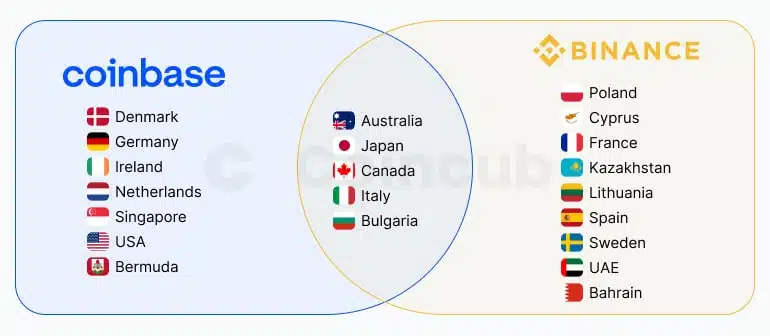
Fig 4: Crypto licensing for Coinbase and Binance
Cryptocurrencies will always appear outside the financial mainstream until regulatory policies become more cohesive – and widespread. So are regulations lagging behind, or are VASPs unwilling to be tied down?
There are plenty of reasons to choose from – and even the largest VASPs are not exempt from restricting their licensing applications around the world due to regulatory uncertainty. But what is to blame – government indecision – or companies wishing to skirt firm regulations?
Of course, with a globally available ‘open-ledger currency’ that spread like wildfire amongst the world’s population, it wasn’t surprising to see governments lagging behind developments. While bitcoin and other cryptocurrencies took off (before the current falling out of favor in the US) many governments were still having difficulty defining what crypto was, making it difficult to set the regulatory tone. Some simply banned it – or partially banned it – such as China and Russia. Some adopted it with hopeful ambitions such as El Salvador and the Central African Republic. Some, like India, Pakistan, Brazil et al just let it run, with minimal regulations. Even in the UK Binance itself was prohibited from operating for failing to satisfy the Financial Conduct Authority over concerns.
Binance holds 14 crypto licenses as a VASP (or DASP), depending on the jurisdiction. According to its website, Binance supports 44 countries and provides services in over 100+ locations. In some of the countries where Binance operates, it does not have a specific crypto license.
As a US-listed company, Coinbase may face more stringent regulatory requirements and may prioritize compliance in countries with more established regulatory frameworks. Coinbase and Binance share crypto licenses in several countries, including Australia, Japan, Canada, Italy, and Bulgaria.
It’s of increasing concern that while banks and other financial services embrace regulation, many crypto service providers stay sidelined, putting user funds at risk. Why so many crypto exchanges have been slow to follow suit, even as regulatory options become available is a continuing problem for the crypto industry.
Continental Drift – held back from the financial mainstream by regulatory uncertainty?
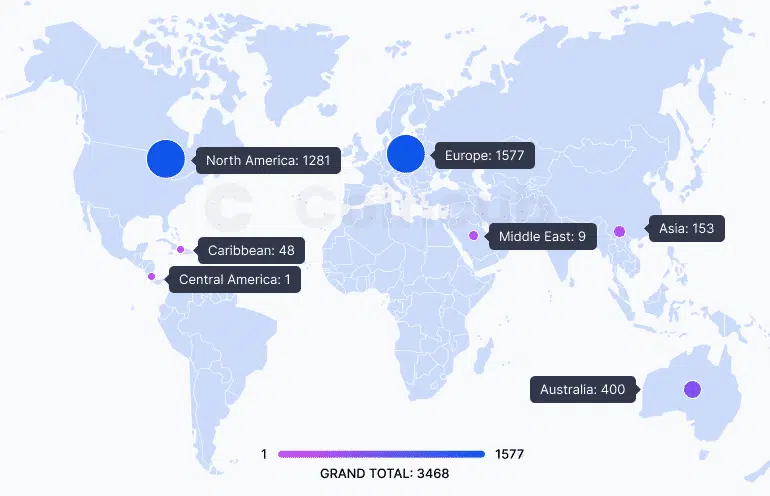
Fig 6: Number of VASP registration by region. One company can have several licenses
Europe has been at the forefront of regulating the cryptocurrency industry, with 1,577 crypto licenses already issued. Also, there seems to be no indication of Europe slowing down in its efforts to establish a regulatory framework for the crypto industry.
MiCA regulations in the EU are expected to provide a clear regulatory framework for VASPs and increase licensing requirements, which could lead to a more regulated and secure environment for crypto businesses. Individual states have up to 18 months to implement MiCA, so it remains to be seen how these regulations will be implemented and their impact on the crypto industry as a whole.
Following Europe, the region with the next highest number of licensed VASPs is North America with 1,281 (boosted hugely by the somewhat surprisingly large total of 1,254 registered VASPs in Canada). For the record, in the top five regions for the licensing of VASPs, Asia comes fourth with 153, the Caribbean fifth with 48, and the Middle East sixth with 9.
Conclusions
Regulatory uncertainty, the speed of technological advancements, consumer preferences, and ever-present cyber security risks in the blockchain and crypto space make it difficult for governments to keep up – or gain wider agreement.
With so many conceptual questions thrown up by cryptocurrency – further complicated by each country’s particular national ambitions – it’s inevitable to find a lack of regulatory consistency across the world. This fragmentation is one plausible reason why so many exchanges limit their approach to licensing. On the other hand, firmer regulation, long regulation application times, and costs may be a deterrent.
Despite these reasons, regulating VASPs and crypto exchanges – driving out those that purely seek light touch regulation – can provide numerous benefits, such as protecting consumers, preventing money laundering, and ensuring a degree of financial control – if not price stability. A generous interpretation towards VASPs may be therefore that lack of regulation in many countries reflects the disruptive nature of the crypto industry, rather than an inherent problem with cryptocurrencies or exchanges themselves.
The recent collapse of FTX highlights the potential consequences for companies that do not seek regulation in the state they operate in. This could lead to a shift in attitudes towards regulation in the crypto industry. As the industry matures, it’s likely that more countries will establish regulatory frameworks to oversee VASPs and crypto exchanges, ultimately promoting the adoption and growth.
Methodology
Virtual or Digital Asset Service Providers known as VASPs or DASPs are companies able to conduct cryptocurrency transactions, including custodial services, and the provision of crypto wallets, and payments which very much dictate the level of cryptocurrency adoption within any country. Money Transmitters, some of which are able to transmit crypto are not strictly speaking VASPs and the index attempts to distinguish between the two.
Source
The report gathered data on VASP and DASP licenses from public websites of financial regulators between March and April 2023, with the exception of Australia where 2020 data, VASPs’ public websites, and expert opinions were used to estimate the total number of licenses.
Database
If you would like access to the full database including over 3000 companies and 39 countries here.
For further questions please contact us: contact@coincub.com






